Related Research Articles

Tan Chong Tee was a Chinese resistance fighter based in Singapore and Malaya during World War II. An accomplished badminton player before the war, he joined Force 136 around 1942 after Singapore fell to the Japanese. In 1944, while on a mission, Tan, along with Lim Bo Seng and other Force 136 members, was captured by the Japanese. He was subjected to torture during his captivity. After the war, he returned to playing badminton and later became a businessman.

Tan Cheng Lock KBE JP was a Malaysian Peranakan businessman and a key public figure who devoted his life to fighting for the rights and the social welfare of the Chinese community in Malaya. Tan was also the founder and the first president of the Malayan Chinese Association (MCA), which advocated his cause for the Malayan Chinese population.

Lee Kong Chian, also known by his alias Lee Geok Kun, was a prominent Chinese businessman and philanthropist based in Malaya and Singapore between the 1930s and the 1960s. He was the founder of the Lee Foundation and one of the richest men in Southeast Asia in the 1950s and 1960s. He was also a son-in-law of Tan Kah Kee, another well-known Chinese businessman and philanthropist based in Southeast Asia.

Bukit Mertajam is the administrative centre of the city of Seberang Perai in Penang, Malaysia. It also serves as the seat of the Central Seberang Perai District. As of 2010, Bukit Mertajam (core) contains a total of 13,097 residents.

Chung Thye PhinMSC, JP was a Chinese Malayan business magnate, planter, miner, bureaucrat, and philanthropist who served as the last Kapitan Cina of Perak and Malaya. He was reported to be the richest man in Penang.
Lim Koon Teck(Chinese: 林坤德) was a barrister-at-law, industrialist and politician in the Malaya and Singapore. He was the first Asian in the Straits Settlements to be appointed to the Colonial Legal Service. He was a magistrate at Penang and Crown Counsel, Singapore. After resigning government service, he joined the Lee Rubber Company. He was interested in introducing new construction methods, like lightweight concrete, to bring down building costs and was interested in helping to solve Singapore's housing shortage. These directed his commercial and political activities.
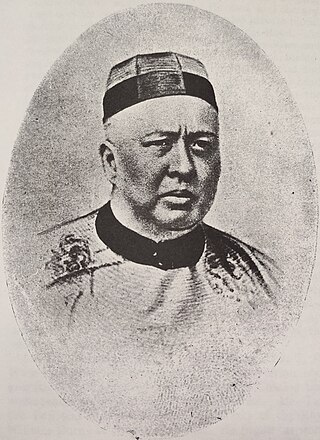
Tan Kim Ching, also known as Tan Kim Cheng, was a Chinese politician and businessman. He was the eldest of the three sons of Tan Tock Seng, the founder and financier of Tan Tock Seng Hospital. He was consul for Japan, Thailand and Russia, and was a member of the Royal Court of Siam. He was one of Singapore's leading Chinese merchants and was one of its richest men in Singapore at that time. He was also the first Asian member of the Straits Branch of the Royal Asiatic Society. After his father's death, he became the Kapitan Cina of the Straits Chinese community. He is believed to have been the head of the Triad in Malaya.

Chung Ling High School is a secondary school in George Town, Penang, Malaysia. It was initially established in 1917 as a primary school, and later became a junior high school in 1923, becoming the oldest extant Chinese high school in Malaysia. Following the merger of The Chinese High School in Singapore in 2005, Chung Ling High School became the oldest surviving Chinese high school in Southeast Asia.

Eu Tong Sen was a leading businessman in Malaya, Singapore and Hong Kong during the late 19th and early 20th century. He was vice-president of the Anti-Opium Society and a member of the Kinta Sanitary Board.
A number of former cemeteries in Singapore were cleared of graves with the land redeveloped during the second half of the twentieth century. The cemeteries had closed when they were either full or were relocated. The records and histories of some of these cemeteries are now left.
Tan Sri Prof. Chin Fung Kee was a respected and outstanding Malaysian civil engineer in engineering practice, as well as engineering research and education. He is known for his excellence in geotechnical, structural and hydraulic engineering. He was a local pioneer engineer who played a key role in the development of engineering education, research and practice in the country. His knowledge and contributions benefited the engineering fraternity both nationally and internationally and his achievements were recognized worldwide.
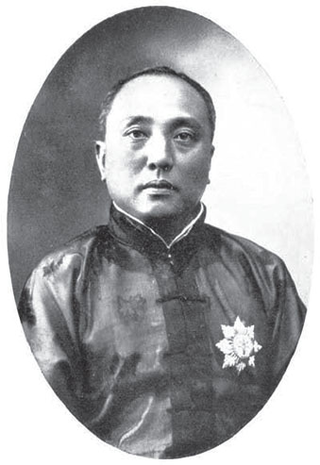
Lim Nee Soon was a Singaporean banker and businessman who promoted social and community matters, and was a respected community leader in Singapore. Lim was of Peranakan descent, with ancestry from Chenghai District, Shantou in Guangdong, China.
Leong Sin Nam 梁燊南, alias Leong Sin, Leung Sin, Leong Sin Hee, was a Malaysian businessman. He migrated and settled in British Malaya in 1898. From humble beginnings, he worked hard to become a wealthy tin mine owner in Perak. He was a businessman, an active community leader and a philanthropist. He was a Chinese revolutionary with similar aspirations as Dr. Sun Yat Sen and a strong supporter of the Chinese war efforts during the Sino-Japanese war.
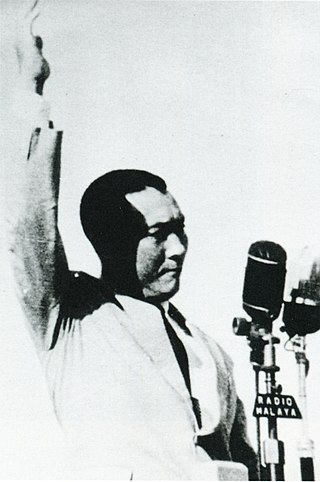
Tan Sri Michael Wong Pow Nee was a Malaysian politician and diplomat. He was Penang's first Chief Minister, serving from 1957 to 1969 and Malaysia's first Ambassador to Rome.

Heah Joo Seang was a Malayan politician, business leader, rubber magnate, philanthropist and especially a supporter of education. Malaysia, as it has since become, only existed after Joo Seang's death. His contributions span three distinct periods in the country's history: the British Malaya period, the Malayan Union period, and the Federation of Malaya period.
The Rubber Trade Association of Penang (槟城树胶公会), one of the oldest surviving rubber trade associations in the country, represents the interests of members of the rubber trade in the state. It is also known as the Penang Rubber Trade Association.
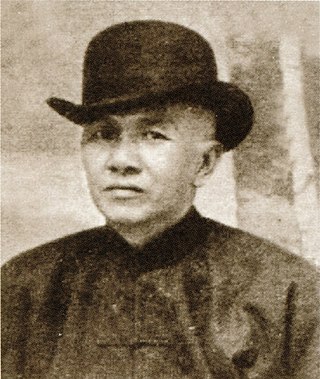
Cheah Tek Thye (Xie Detai| J.P., was a 19th-century Penang businessman, banker, and lawmaker and a principal headman of the "Cheah" clan.
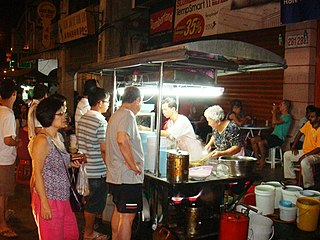
Penangite Chinese are ethnic Chinese Malaysians of full or partial Chinese ancestry who either hail from or live within the State of Penang. As of 2020, nearly 45% of Penang's population belonged to the Chinese ethnic group, making ethnic Chinese the largest ethnic community within the state.

Teo Eng Hock was a rubber tycoon and the founder of the Singaporean branch of the Tongmenghui and later the Kuomintang. He later moved to China and became involved in politics there.
References
- 1 2 3 4 5 "Tan Kheam Hock". Reference@NLB. National Library Board . Retrieved 7 March 2023.
- 1 2 3 Song, Ong Siang (1923). One Hundred Years' History of the Chinese in Singapore. J. Murray. p. 257-259.
- ↑ "LATE MR. TAN KHEAM HOCK". The Malaya Tribune. Singapore. 2 May 1922. Retrieved 7 March 2023.
- ↑ "AN UNTIMELY DEATH". The Malaya Tribune. Singapore. 22 April 1922. Retrieved 7 March 2023.
- ↑ Chong, Guang Kwa; Bak, Lim Kua (2019). A General History Of The Chinese In Singapore. World Scientific. p. 176. ISBN 9813277653.
- ↑ Ng, Yew Peng (2017). What's In The Name? How The Streets And Villages In Singapore Got Their Names. World Scientific. p. 272. ISBN 981322147X.